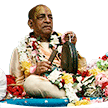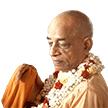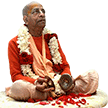Purusa - an essential subject: Difference between revisions
Nayanranjani (talk | contribs) (Created page with "Category:Essential Subjects <!----------------------- edit below this line -----------------------> <!------------------------ begin introduction text below ------------...") |
(Vanibot #0041: Moves Choose Another box to the end) |
||
| Line 2: | Line 2: | ||
<!----------------------- edit below this line -----------------------> | <!----------------------- edit below this line -----------------------> | ||
<!------------------------ begin introduction text below ------------------------> | <!------------------------ begin introduction text below ------------------------> | ||
Purusa is defined as 'man'. So who is the man that we talk about in the spiritual context? Vedas state that there is only one man in this whole cosmic creation, and that is Lord Krishna, the originator and creator of this entire creation. Since He is the only 'man' or the 'enjoyer', the rest of this material energy is known as prakriti; servants of Lord Krishna. This is our real constitutional position. Moreover, since Lord Krishna is known as purusa, He is known to have a form; therefore, one can conclude that God is not formless but has a personal form which we should worship as His eternal servants. | |||
Srila Prabhupada's books, lectures, conversations and letters offer a comprehensive presentation of this essential subject as seen in the Vaniquotes '''[[Vaniquotes:Category:Purusa|Purusa]]''' category. An introduction from his books is given below in the following | Srila Prabhupada's books, lectures, conversations and letters offer a comprehensive presentation of this essential subject as seen in the Vaniquotes '''[[Vaniquotes:Category:Purusa|Purusa]]''' category. An introduction from his books is given below in the following 8 quotes. | ||
<!-------- end introduction text and don't touch next three lines ---------> | <!-------- end introduction text and don't touch next three lines ---------> | ||
---- | ---- | ||
== Quotes from Srila Prabhupada's books == | == Quotes from Srila Prabhupada's books == | ||
<!----------------- edit quote boxes below this line -----------------> | <!----------------- edit quote boxes below this line -----------------> | ||
{{VaniQuotebox| | {{VaniQuotebox|Pradhana means subtle matter, such as ether. Purusa means the spiritual spark living entities who are entangled in that subtle material existence. These may also be described as para prakrti and apara prakrti, as stated in Bhagavad-gita|The mahat-tattva, or the sum total of the material creation, is to be understood to be the ultimate end of all universes, including all the living entities therein. Brahman is the resort of the mahat-tattva, which includes all material and spiritual entities. It is described in this connection that the Supreme Brahman, the Personality of Godhead, is the master of both pradhāna and puruṣa. Pradhāna means subtle matter, such as ether. puruṣa means the spiritual spark living entities who are entangled in that subtle material existence. '''(Śrīmad-Bhāgavatam 4.8.78)'''}} | ||
{{VaniQuotebox| | {{VaniQuotebox|Purusa is the central objective of all knowledge, because it is this ksetrajna alone that creates everything in conjunction with the material body and mind and the allied physical elements|We shall get full opportunity to discuss all these subjects more elaborately, but for the present we may be satisfied simply by knowing that the kṣetrajña (puruṣa, or enjoyer) is the central objective of all knowledge, because it is this kṣetrajña alone that creates everything in conjunction with the material body and mind and the allied physical elements. '''(Message of Godhead, Chapter 2)'''}} | ||
{{VaniQuotebox| | {{VaniQuotebox|If one performs activities for the satisfaction of the Supreme Personality, the yajna-purusa, his work does not produce reactions, whereas karmis, who act for themselves, are bound by the reactions of their work|Yajñārthāt karmaṇo 'nyatra loko 'yaṁ karma-bandhanaḥ: if one performs activities for the satisfaction of the Supreme Personality, the yajña-puruṣa, his work does not produce reactions, whereas karmīs, who act for themselves, are bound by the reactions of their work. A liberated person, therefore, does not think about whatever he has ignorantly done in the past; instead, he acts in such a way that he will not produce another body by fruitive activities. '''(Śrīmad-Bhāgavatam 5.1.16)'''}} | ||
{{VaniQuotebox| | {{VaniQuotebox|Sakti is feminine, and the Lord is purusa, masculine. It is the duty of the female to serve under the supreme purusa. As stated in Bhagavad-gita, all living entities are marginal energies of the Supreme Lord|Sakti is feminine, and the Lord is puruṣa, masculine. It is the duty of the female to serve under the supreme puruṣa. As stated in Bhagavad-gītā, all living entities are marginal energies of the Supreme Lord. Therefore it is the duty of all living entities to serve this Supreme Person. '''(Śrīmad-Bhāgavatam 4.7.59)'''}} | ||
{{VaniQuotebox| | {{VaniQuotebox|It is stated in the Bhagavad-gita that the impersonal Brahman effulgence is also an emanation from the Absolute Personality of Godhead Sri Krsna. The parama-purusa cannot be anyone except Sri Krsna Himself|It is stated in the Bhagavad-gītā that the impersonal Brahman effulgence is also an emanation from the Absolute Personality of Godhead Śrī Kṛṣṇa. The parama-puruṣa cannot be anyone except Śrī Kṛṣṇa Himself. '''(Śrīmad-Bhāgavatam 1.7.4)'''}} | ||
{{VaniQuotebox| | {{VaniQuotebox|The living entity desires a particular type of material enjoyment, and thus the Lord supplies him with a body, which is like a machine. Just to keep him alive in that body, the Lord remains with him as the purusa (Ksirodakasayi Visnu)|The living entity, who is part and parcel of the Supreme Personality of Godhead, exists on the mercy of the Lord, who is always with him in any form of body. The living entity desires a particular type of material enjoyment, and thus the Lord supplies him with a body, which is like a machine. Just to keep him alive in that body, the Lord remains with him as the puruṣa (Kṣīrodakaśāyī Viṣṇu). '''(Śrīmad-Bhāgavatam 7.14.37)'''}} | ||
{{VaniQuotebox| | {{VaniQuotebox|The Lord is always described as the parama-purusa, or the supreme male personality. Thus the affection between the Lord and the living entities is something like that between the male and the female. Therefore the term love of Godhead is quite appropriate|Love is a word which is often used in relation with man and woman. And love is the only word that can be properly used to indicate the relation between Lord Kṛṣṇa and the living entities. The living entities are mentioned as prakṛti in the Bhagavad-gītā, and in Sanskrit prakṛti is a feminine object. The Lord is always described as the parama-puruṣa, or the supreme male personality. Thus the affection between the Lord and the living entities is something like that between the male and the female. Therefore the term love of Godhead is quite appropriate. '''(Śrīmad-Bhāgavatam 1.7.7)'''}} | ||
{{VaniQuotebox| | {{VaniQuotebox|The potent energy displayed by Sri Krsna is far more extensive than that of the purusas. Sri Krsna is therefore the original father and Lord who protects all creative manifestations through His various plenary portions|The controlling Deities of the living beings in the mundane worlds are the three puruṣa-avatāras. But the potent energy displayed by Śrī Kṛṣṇa is far more extensive than that of the puruṣas. Śrī Kṛṣṇa is therefore the original father and Lord who protects all creative manifestations through His various plenary portions. '''(Caitanya-caritāmṛta, Ādi-līlā 2.42)'''}} | ||
<!----------------- edit quote boxes above this line -----------------> | <!----------------- edit quote boxes above this line -----------------> | ||
| Line 31: | Line 31: | ||
'''Purusa - [[Vaniquotes:Category:Purusa|explore more within this category]]'''. | '''Purusa - [[Vaniquotes:Category:Purusa|explore more within this category]]'''. | ||
{{EsentialSubjectTotal}} | {{EsentialSubjectTotal}} | ||
<div style="float:left;"> | |||
{{EssentialSubjectnav}} | |||
</div> | |||
__NOTOC__ | __NOTOC__ | ||
__NOEDITSECTION__ | __NOEDITSECTION__ | ||
Latest revision as of 17:16, 22 November 2020
Purusa is defined as 'man'. So who is the man that we talk about in the spiritual context? Vedas state that there is only one man in this whole cosmic creation, and that is Lord Krishna, the originator and creator of this entire creation. Since He is the only 'man' or the 'enjoyer', the rest of this material energy is known as prakriti; servants of Lord Krishna. This is our real constitutional position. Moreover, since Lord Krishna is known as purusa, He is known to have a form; therefore, one can conclude that God is not formless but has a personal form which we should worship as His eternal servants.
Srila Prabhupada's books, lectures, conversations and letters offer a comprehensive presentation of this essential subject as seen in the Vaniquotes Purusa category. An introduction from his books is given below in the following 8 quotes.
Quotes from Srila Prabhupada's books
Purusa - explore more within this category.
Vanipedia has now over 903 introductory articles compiled from Srila Prabhupada's books under the series titled Essential Subjects. All these articles can be seen in the Table of Content on the right side of this article and also here in this Umbrella Category. Browse through them to relish the breadth and depth of Srila Prabhupada's teachings - There is a subject for everyone.







